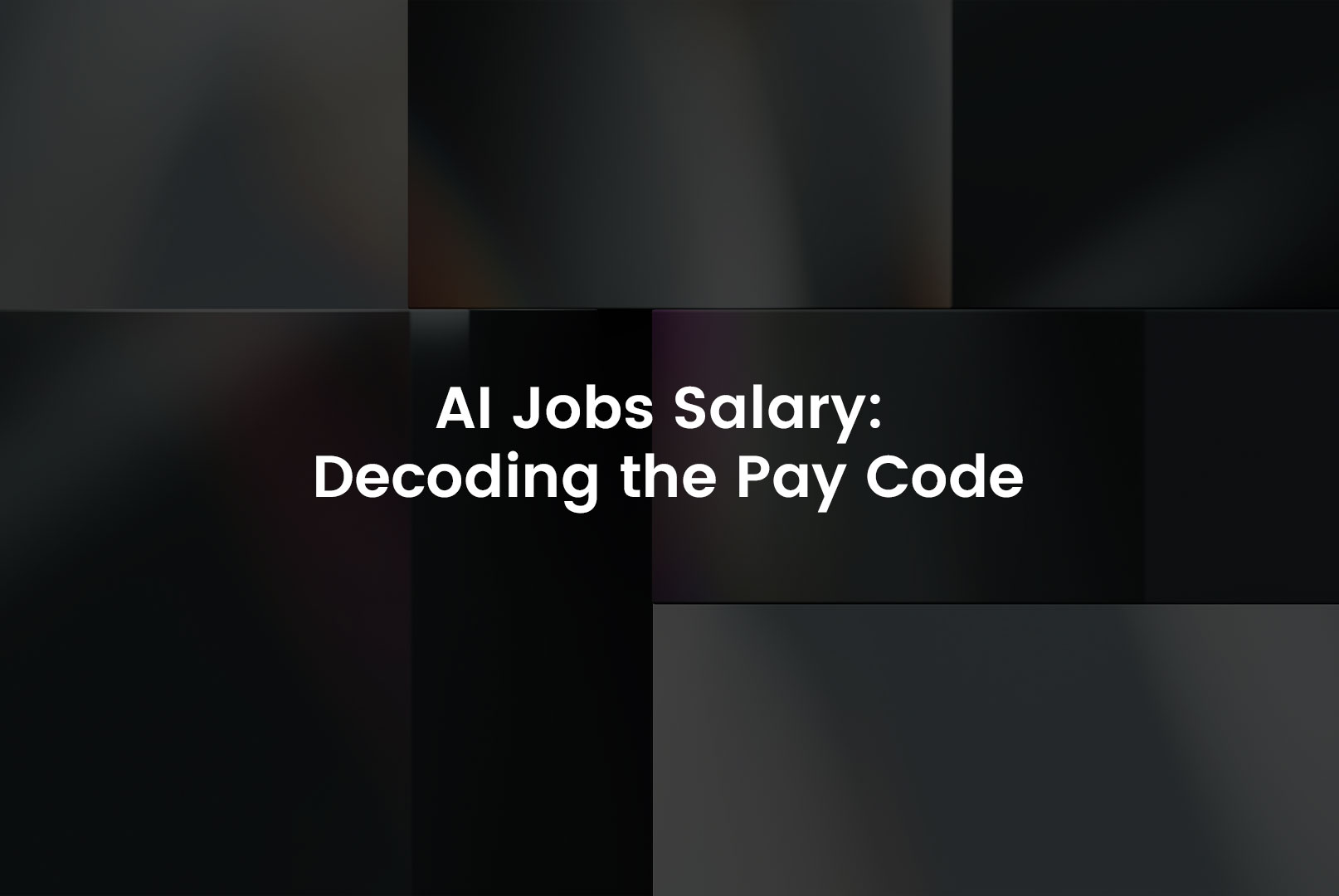Ever wonder how your smart speaker knows exactly what music you’re in the mood for, or how that online store keeps suggesting the perfect pair of shoes you totally didn’t need? That’s the magic of AI at work, quietly transforming our lives (and wardrobes). But beyond the cool gadgets and creepy-accurate recommendations, there’s a whole world of AI jobs out there, and they’re not just for robot whisperers and coding wizards.
So, you’re curious about diving into the AI world, but one question lingers: how much do these jobs actually pay? Well, buckle up, because the answer is just as diverse as the jobs themselves. From data wranglers to robot ethicists, AI offers a spectrum of opportunities – and paychecks – to match your skills and interests. Let’s crack the code on AI salaries and see what hidden treasures await!
What Affects Your AI Job Salary?
Okay, we’ve established that AI jobs aren’t just about cool tech and robot friends (although, let’s be honest, that’s part of the appeal). But before you start picturing yourself swimming in a pool of binary code-infused gold coins, let’s talk about the real deal: what actually affects your AI job salary? Brace yourself, because it’s not a one-size-fits-all answer. Your earning potential in the AI world depends on a few key factors, like a choose-your-own-adventure game (minus the dragons, hopefully).
1. The Role You Choose:
Imagine yourself as a character in an AI RPG. Do you see yourself wielding the mighty data sword as a Data Scientist (averaging $120,000/year), building epic AI models as a Machine Learning Engineer (around $130,000/year), or guiding AI projects with your business magic as an AI Product Manager (think $115,000/year)? Each role has its own pay range, based on the skills and experience it demands.
2. Experience is Your Level-Up:
Remember how RPG characters get stronger with each quest? The same applies in the AI world. The more experience you have under your belt, the higher your level (and salary) climbs. Entry-level positions might start lower, but as you gain expertise and conquer project dragons, your paychecks start reflecting your awesomeness.
3. Location, Location, Location:
Just like real estate, your AI jobs salary can vary depending on where you live. Think Silicon Valley’s tech giants offering higher salaries compared to smaller cities. So, research your target location and factor it into your pay expectations.
4. Industry Matters:
Different industries value AI skills differently. Tech companies might generally offer higher salaries compared to healthcare or non-profit organizations. Do your research on the industry you’re targeting to understand its AI salary landscape.
5. Company Size: Startup Spark or Corporate Castle?
Imagine the difference between a cozy, cash-strapped startup and a towering tech giant. While startups might offer exciting opportunities and potential equity, established corporations often have more stable salaries and benefits. Choose wisely, young adventurer!

How Much Do They Get Paid?
Alright, adventurers! We’ve explored the factors affecting your AI job salary, now let’s crack open the treasure chest and see what riches await. Here’s a handy dandy table to decode the average salary ranges for those key AI roles we mentioned:
| Role | Average Salary Range (US) |
| Data Scientist | $82,000 – $174,000 |
| Machine Learning Engineer | $92,000 – $180,000 |
| AI Product Manager | $70,000 – $160,000 |
| AI Content Writer/Strategist | $55,000 – $110,000 |
| AI Ethicist/Analyst | $75,000 – $120,000 |
Remember, these are just averages, and your actual salary can vary based on the factors we discussed earlier. But hey, at least you have a ballpark figure to set your sights on!
But wait, there’s more to the treasure than just base salary! Don’t forget about:
- Bonuses: Many companies offer performance-based bonuses, which can add a significant bump to your annual income.
- Stock Options: Particularly in startups, stock options can be a lucrative way to share in the company’s success. Just remember, they come with their own risks and vesting periods.
- Benefits: Health insurance, paid time off, and other benefits can add significant value to your overall compensation package.
So, when evaluating an AI job offer, consider the whole package, not just the base salary. Now, before you rush off to conquer your dream AI job.
Claiming Your AI Payday: Tips to Maximize Your Earning Potential
Let’s talk about maximizing your earning potential in this exciting field.
Here are some key moves to level up your salary game:
1. Sharpen Your Skill Set: Think of your skills as your AI superpowers. Focus on mastering in-demand skills like data analysis, machine learning, programming languages (Python, R), and cloud computing. Online courses, bootcamps, and personal projects are your training grounds. Remember, continuous learning is key in the ever-evolving AI world.
2. Build an Epic Portfolio: Showcasing your skills and experience is crucial. Create a portfolio website or leverage online platforms like GitHub to display your projects, data visualizations, or written content related to AI. Let your work speak for itself (and attract potential employers)!
3. Network Like a Social Butterfly: The AI community is buzzing with opportunities. Attend industry events, join online forums, and connect with professionals on LinkedIn. Building relationships can open doors to hidden job opportunities and valuable insights.
4. Negotiation Ninja: Don’t be afraid to negotiate your salary! Research the average salary range for your desired role and location. Prepare talking points highlighting your skills and experience, and confidently communicate your worth. Remember, negotiation is a skill that can benefit you throughout your career.
Bonus Tip: Stay up-to-date on the latest trends and advancements in AI. By demonstrating your knowledge and adaptability, you position yourself as a valuable asset in the ever-evolving AI landscape.
Conclusion: AI Jobs Salary
So there you have it, adventurers! We’ve navigated the twists and turns of the AI salary landscape, from decoding pay factors to maximizing your earning potential. Remember, the AI job market is vast and diverse, offering opportunities for various skillsets and interests. Whether you’re a data wizard, a coding codebreaker, or an ethical mastermind, there’s an AI role waiting to challenge and reward you.
But your journey doesn’t end here! Use this knowledge as your map, and continue exploring:
- Dive deeper into specific roles: Research job descriptions, salary comparison tools, and industry reports to refine your target.
- Sharpen your skills: Online courses, bootcamps, and personal projects are your training grounds. Remember, continuous learning is key!
- Connect with the community: Network with professionals, attend events, and build relationships to unlock hidden opportunities.
- Don’t be afraid to negotiate: Research your worth and confidently communicate your value when the time comes.
Remember, the future of AI is bright, and you have the power to shape it. So, what are you waiting for? Start your AI salary adventure today!
FAQs
What factors influence salaries in AI jobs?
- Salaries in AI jobs are influenced by factors such as expertise level, job role, industry demand, geographical location, and the specific technologies used.
How do AI job salaries vary by role?
- Salaries can vary significantly, with roles like AI research scientists and machine learning engineers often at the higher end, while entry-level positions like data analysts may be at the lower end.
What is the average salary for AI professionals?
- While specific numbers fluctuate, AI professionals often command high salaries, with averages ranging significantly based on location, experience, and role.
Are AI job salaries higher in certain industries or regions?
- Yes, industries such as technology, healthcare, and finance, as well as regions like Silicon Valley and other tech hubs, often offer higher salaries due to high demand and cost of living.
How can one increase their salary in the AI field?
- Increasing salary potential can be achieved by gaining specialized skills, earning advanced degrees, obtaining certifications, and accumulating experience in high-demand areas of AI.
What education is needed for a career in AI?
- Careers in AI typically require at least a bachelor’s degree in computer science, mathematics, or a related field, with many positions preferring or requiring a master’s or doctoral degree.
What are the emerging trends in AI that could affect future salaries?
- Emerging trends include the rise of AI ethics, AI in healthcare, quantum computing, and AI-powered cybersecurity, potentially leading to increased demand and salaries for experts in these areas.
How does the rise of AI impact job markets and salaries in other fields?
- The rise of AI is creating new job opportunities in tech and non-tech fields alike while also requiring professionals to adapt by learning new skills, potentially affecting salary trends across various industries.
What are some common challenges faced by AI professionals?
- Challenges include keeping up with rapid technological advancements, ethical considerations in AI development, and the competitive job market.
How can professionals transition into high-paying AI roles?
- Transitioning into high-paying AI roles often involves continuous learning, networking in the tech community, gaining practical experience through projects or internships, and specializing in niche areas of AI.




